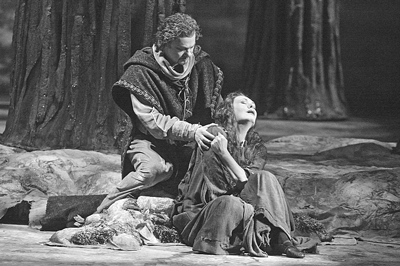Volpe’s tenure ends aptly, with highs and lows
The last weeks of Joseph Volpe’s regime at the Metropolitan Opera featured revivals of productions strong and weak. Carried over from last year, “Rodelinda,” still lovely to see (May 10) and a worthwhile evening, suffered from a less invigorating and stylish conductor (Patrick Summers) who allowed its puzzlingly unmoving leading lady (Renée Fleming) even more space for self-indulgent mannerisms. Stephanie Blythe recreated a strong performance, and did Kobie van Rensburg, though his tenor seemed receded on top.
Replacing the excellent David Daniels and Bejun Mehta were plausible candidates in the countertenor sweepstakes, Andreas Scholl and Christophe Dumaux. Scholl had improved some a stage presence since I saw him grin through Bertarido’s part in Paris five years ago, but his attractive tone remained monochrome; the words were rarely engaged. The willowy Dumaux—the world’s thinnest opera singer?—sang with commendable style but sounded shallow-toned in the big auditorium, especially after Mehta’s rather magical Unulfo.
Musically, at least, Volpe’s Met was often at (or near) its best in Wagner, and—even with presiding Wagnerian pit deity James Levine unhappily sidelined by a fall, the end of season “familial” pairing went down very well. (Though the operas are otherwise unrelated, the lead of the 1851 “Lohengrin” is the son of the 1882 “Parsifal.”) Robert Wilson’s production of the former, rather stilted on first unveiling in 1998, has become a real work of art, in no small part due to Karita Mattila’s mastery of the Wilson plastique.
The May 6 performance under Philippe Auguin’s sure baton in places approached transcendent, especially with the near-angelic singing of Klaus Florian Vogt in the lead. How he managed to project a small, pure lyric voice over the Met orchestra I don’t know, nor what other parts he might assume there; Loge, perhaps? Coupled with storybook hero looks and beautiful diction, it proved quite magical, and after a slow start vocally Mattila rose triumphantly to the occasion. Fabulous as Luana deVol’s veteran Ortrud looked, best of the others were René Pape (King) and the always strong Eike Wilm Schulte (Herald).
Pape also sang extremely well as Gurnemanz in May 15’s “Parsifal,” though not for me eclipsing Kurt Moll’s portrayal. Waltraud Meier’s Kundry, oddly soignée throughout, was a real tour de force. Ben Heppner, a winningly earnest Parsifal, sang very creditably, without the cracking that had marred his “Lohengrin” broadcast. Thomas Hampson delivered a committed, sonorous Amfortas and Nikolai Putilin a barky Klingsor. Peter Schneider, sound if rather pedestrian otherwise, got into Act II’s tempestousness.
Another excellent Finnish soprano has an image and vocal approach poles apart from Mattila. Soile Isokoski, in town for some Countess Almavivas at the Met, joined the phenomenal pianist Mitsuko Uchida May 5 for a rewarding evening of Mozart and Sibelius under guest conductor Sir Colin Davis.
In principle, any Lincoln Center tenant should be ashamed of programming one more “Ch’io mi scordi di te? Non temer,” the Mozart concert aria that utilizes both a star pianist and a star singer and thus gets trotted out year after year with the regularity of the “Pearl Fishers” duet at opera galas. But no one could complain when these superb, straightforward Mozarteans brought their musicianship to the piece. Isokoski’s crystalline voice does not expand at the top, so that her reading of Sibelius’ short and telling “Luonnotar” is less extroverted than Mattila’s, as heard at Tanglewood recently; but it had its own intensity and validity. Uchida’s traversal of Mozart’s 26th Piano Concerto was sensational, the seemingly effortless production of even, elegant tone imbued with rare soulfulness.
“L’elisir d’amore” (May 17) stood out chiefly for Giuseppe Filianoti’s Nemorino, not in consistent voice but at his best something like ideal—cute but clueless, visibly consumed with love for Adina, channeling a beautiful lyric tenor through thoughtfully inflected phrases with dynamic subtlety and verbal point. Filianoti remains one of this season’s great acquisitions. Alessandro Corbelli’s somewhat rustily sung Dulcamara at least showed an idiomatic old pro at work.
The rest—prancing choristers and cheaply hideous greeting card production—proved a real trial. Donizetti’s comedy is sit-com simple—why can’t the company mount a better staging than this? If her extreme top now changes color, much of Ruth Ann Swenson’s soprano admirably remains in remarkable shape technically; if only she could give some hint of expressive weighting to her phrasing, make some emotional connection with the words! Opportunity after opportunity passed her by—the bemused but proudly honest start of “Chiedi all’ aura;” the heartfelt words “Quanto amore!” and the single word “Prendi” before Adina’s last cavatina, when the character seems to be choking back tears. How could a singer of two decades’ experiences on international stages make nothing of them? I have enjoyed Swenson’s voice since her—and my—student days, but wish she wouldn’t have settled for blank Sutherlandish droopiness and “Disney princess” soubrette cloying interpretively.
Peter Coleman-Wright’s Belcore, mediocre or worse in vocal quality and enacted like a cartoon prat, was an insult to the paying customers and the many qualified lyric baritones in young artist programs all over America, to say nothing of the Met’s own roster. Yet another needless “British Commonwealth” casting! Maurizio Barbacini’s sluggish baton and lack of coordination with the singers was no asset either.
David Shengold (shengold@yahoo.com) writes about opera for many venues.
gaycitynews.com



































